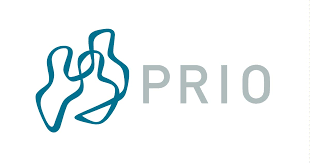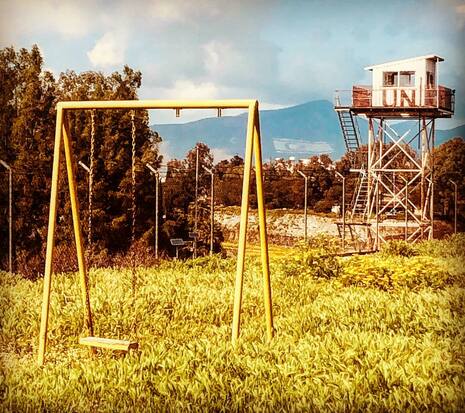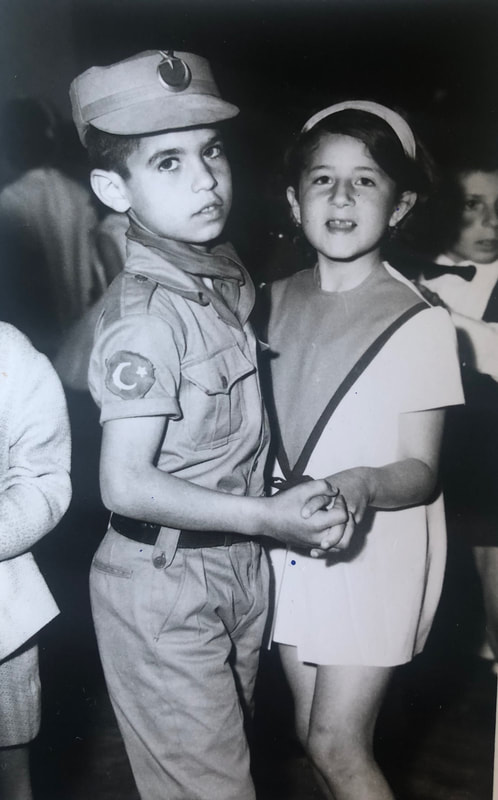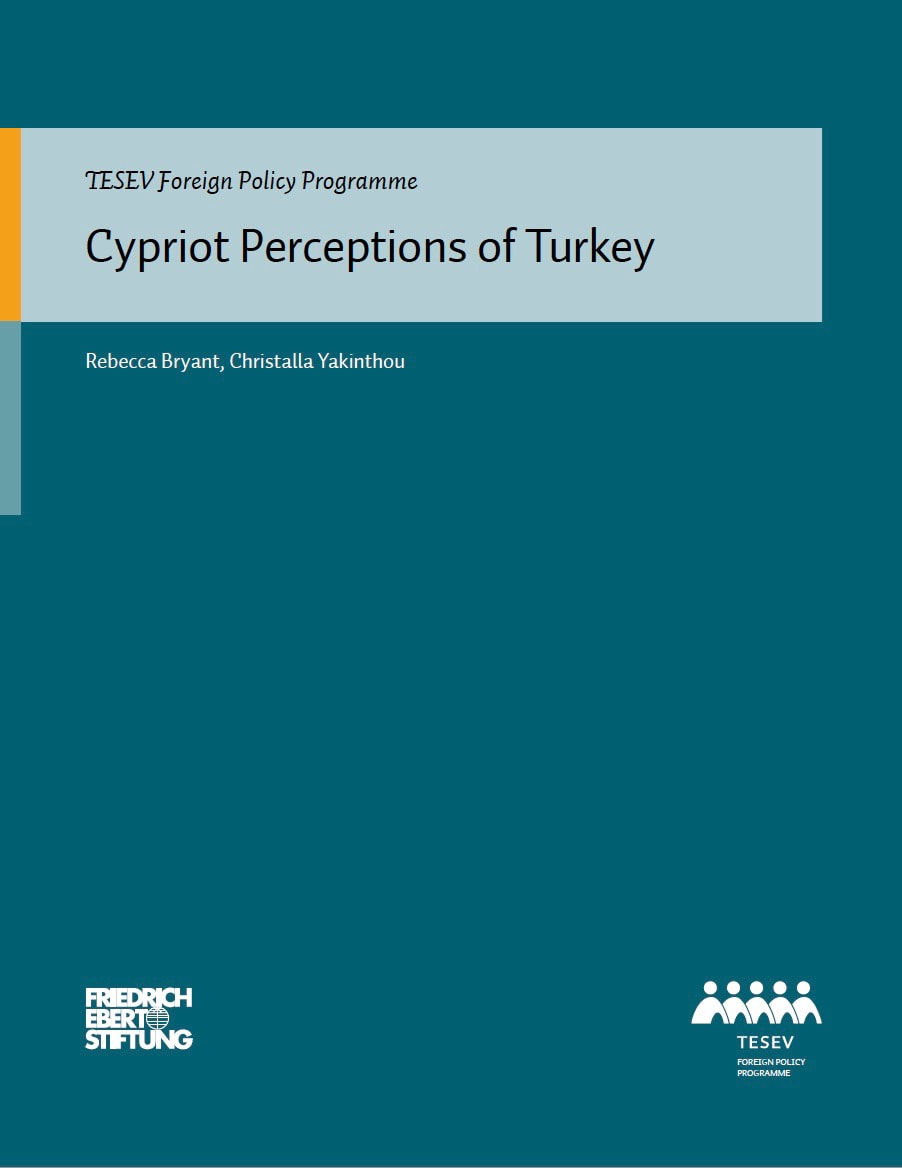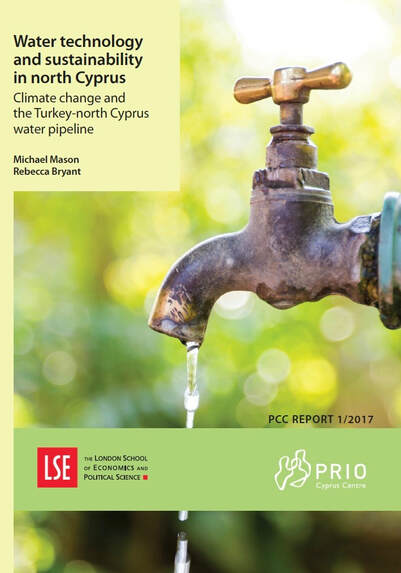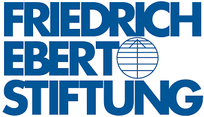One part of my 2003-05 research on the opening of the checkpoints in Cyprus (see Forced Migration) concerned the problem of property left behind on either side of the divide--property that in most cases is currently being used by others. At the time of my research, Greek Cypriot property owners had opened a series of cases before the European Court of Human Rights, representing a new form of "lawfare" in which a sovereignty contest was being played out in transnational arenas of justice. Indeed, global and transnational sites for disputing sovereignty became spaces for reconfiguring the ground of the conflict even as negotiations to resolve it were ongoing.
My interest in these new ways of contesting sovereignty in the context of globalization led to a collaboration with my colleague Åshild Kolås of the Peace Research Institute Oslo and to funding from the Norwegian Research Council for a four-year project, Imagined Sovereignties: Frontiers of Statehood and Globalization.
Through an investigation and comparison of three empirical cases--Northeast India, Cyprus and the Basque country--the collaborative project explored the changing conditions and spaces for exercising and demanding sovereignty in the contemporary world, and how sovereignty is imagined under these conditions. Conducted between 2012 and 2016, my own research resulted in three book publications: De Facto Dreams: Building the So-Called State (co-authored with Mete Hatay), forthcoming with University of Pennsylvania Press in late 2019; a single-authored ethnography, Faking the State: On Pirates, Puppets, and Other Unbecoming Subjects, currently under revision for publication; and a co-edited volume (with Madeleine Reeves), The Everyday Lives of Sovereignty, forthcoming with Cornell University Press. For more on these book projects, see Publications.
Below, I explore the main themes and theoretical directions of this work.
My interest in these new ways of contesting sovereignty in the context of globalization led to a collaboration with my colleague Åshild Kolås of the Peace Research Institute Oslo and to funding from the Norwegian Research Council for a four-year project, Imagined Sovereignties: Frontiers of Statehood and Globalization.
Through an investigation and comparison of three empirical cases--Northeast India, Cyprus and the Basque country--the collaborative project explored the changing conditions and spaces for exercising and demanding sovereignty in the contemporary world, and how sovereignty is imagined under these conditions. Conducted between 2012 and 2016, my own research resulted in three book publications: De Facto Dreams: Building the So-Called State (co-authored with Mete Hatay), forthcoming with University of Pennsylvania Press in late 2019; a single-authored ethnography, Faking the State: On Pirates, Puppets, and Other Unbecoming Subjects, currently under revision for publication; and a co-edited volume (with Madeleine Reeves), The Everyday Lives of Sovereignty, forthcoming with Cornell University Press. For more on these book projects, see Publications.
Below, I explore the main themes and theoretical directions of this work.
The Aporetic StateIn recent publications, both single-authored and with my collaborator Mete Hatay, I have developed the concept of the aporetic state to describe de facto political entities that are perceived to be "real," even as their "citizens" and the international community declare them to be unrealizable.
|
Looking to the Five Finger Mountains past the Nicosia buffer zone. Photo by M. Hatay.
|
Publications:
De Facto Dreams: Building the So-Called State (with Mete Hatay), University of Pennsylvania Press, forthcoming December 2019 (see Books).
"Sovereignty," International Encyclopedia of Anthropology, ed. Hillary Callan (London: Wiley Blackwell, 2018).
"Guns and Guitars: Simulating Sovereignty in a State of Siege,"co-authored with Mete Hatay, American Ethnologist 38:4 (2011), pp. 631-649.
"Sovereignty," International Encyclopedia of Anthropology, ed. Hillary Callan (London: Wiley Blackwell, 2018).
"Guns and Guitars: Simulating Sovereignty in a State of Siege,"co-authored with Mete Hatay, American Ethnologist 38:4 (2011), pp. 631-649.
Sovereign Agency
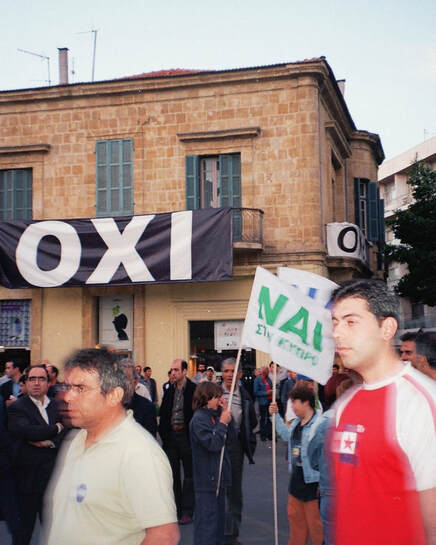
Sovereign Longings, co-edited with Madeleine Reeves,
uses cases of contested or compromised sovereignty to
develop an anthropology of what we call “sovereign
agency”: that is, the variety of quotidian actions through
which such “exceptional” political configurations are
lived and sovereign claims enacted. Building on an
emergent anthropological literature on aspirations for
the state and “normal lives,” this volume looks at desires
for the state and for effective statehood as attempts to
achieve sovereign agency. We ask: what is it that people
desire when they desire political sovereignty? How and
when do these desires align—or not—with the
institutional form of the state? At what point are they
expressed as a desire for the state? What would
constitute effective sovereign agency? What political and
institutional actors and practices allow people to
articulate their political tactics and strategies? And what
A "no" banner and "yes" signs in advance of the 2004 reunification referendum kind of alliances do people make with non-state or supra-
in Cyprus. Photo by R. Bryant. state agencies and institutions for the articulation of
their political desires?
Sociality Under SiegeIn the Agambenian critique of sovereignty, those who are banned from the political life of the state become "bare life," persons who may be killed but not sacrificed. Yet, persons living in ghettoes, enclaves, and camps develop social structures and hierarchies, engage in political participation, and have their own cultural and linguistic practices. In various works, I have explored how enclavism and confinement may entail solidarity and even "enjoying one's exception."
|
“The Jasmine Scent of Nicosia: On Returns, Revolutions, and the Longing for Forbidden Pasts,” co-authored with Mete Hatay, Journal of Modern Greek Studies 26:2 (2008), pp. 423-449.
"Guns and Guitars: Simulating Sovereignty in a State of Siege,"co-authored with Mete Hatay, American Ethnologist 38:4 (2011), pp. 631-649.
"Living with Liminality: De Facto States on the Threshold of the Global,"
Brown Journal of World Affairs 20:2 (2014), pp. 125-44.
"Guns and Guitars: Simulating Sovereignty in a State of Siege,"co-authored with Mete Hatay, American Ethnologist 38:4 (2011), pp. 631-649.
"Living with Liminality: De Facto States on the Threshold of the Global,"
Brown Journal of World Affairs 20:2 (2014), pp. 125-44.
Paternal Patronage
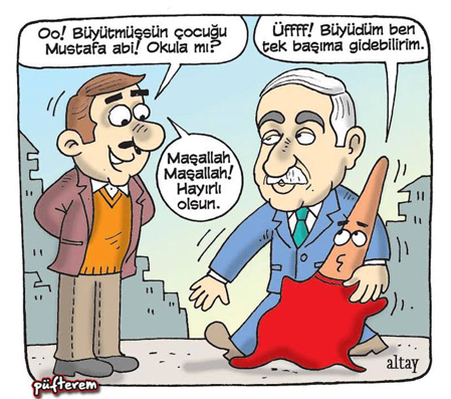
In a number of publications, I explore the relationship
between the de facto state in north Cyprus and its
patron state, Turkey. Because of perceived ties of
ethnicity and kinship, the relationship constitutes what
I call a paternal patronage, and one that often slides
into the paternalistic. I explore the relationship at
length in the forthcoming De Facto Dreams: Building the
So-Called State (with Mete Hatay) and Faking the State:
On Pirates, Puppets, and Other Unbecoming Subjects (see
Publications). Some of this work is summarized in
reports sponsored by TESEV, the Friedrich Ebert
Stiftung, and the London School of Economics.
between the de facto state in north Cyprus and its
patron state, Turkey. Because of perceived ties of
ethnicity and kinship, the relationship constitutes what
I call a paternal patronage, and one that often slides
into the paternalistic. I explore the relationship at
length in the forthcoming De Facto Dreams: Building the
So-Called State (with Mete Hatay) and Faking the State:
On Pirates, Puppets, and Other Unbecoming Subjects (see
Publications). Some of this work is summarized in
reports sponsored by TESEV, the Friedrich Ebert
Stiftung, and the London School of Economics.
Cartoon of current Turkish Cypriot leader Mustafa Akıncı and a Turkish interlocutor:
"Oh, your child has grown, Mustafa abi! Are you taking him to school?"
The child Cyprus replies: "Uhhh! I've grown up and can go to school on my own."
"Good for you!"
"Oh, your child has grown, Mustafa abi! Are you taking him to school?"
The child Cyprus replies: "Uhhh! I've grown up and can go to school on my own."
"Good for you!"
Proudly powered by Weebly

